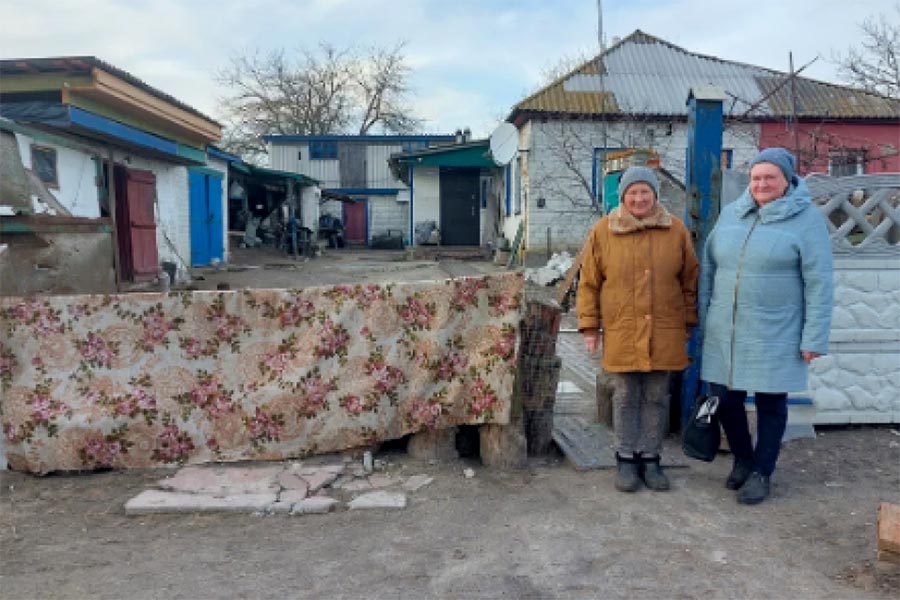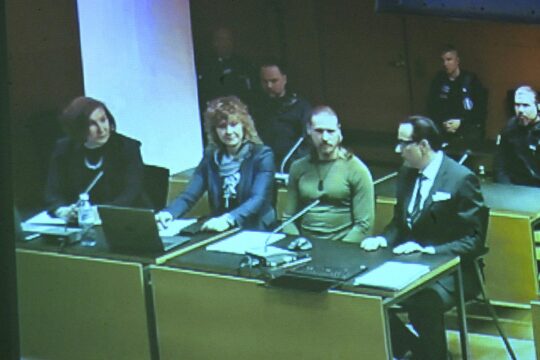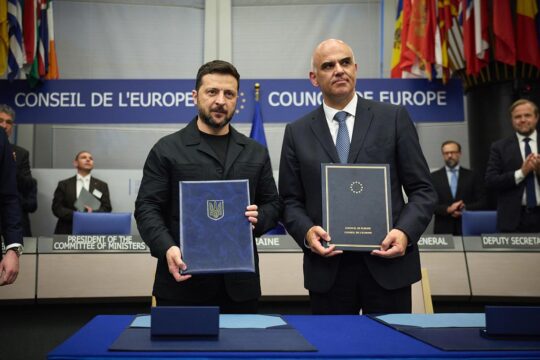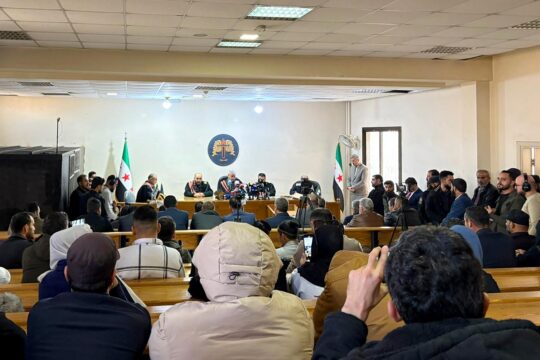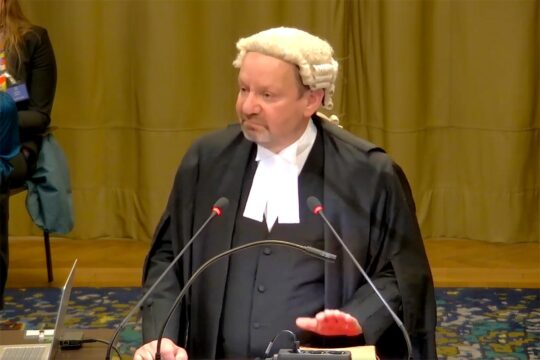At midday on 10 March 2022, near a church in the village of Lukashivka in the Chernihiv region, North of Ukraine, a Russian soldier with a half-burned face, wearing a leather jacket over his uniform, shot a Ukrainian prisoner of war at point-blank range.
He then began to interrogate two civilian men and a minor, with the same brutal interrogation methods: beatings, death threats, and a machine gun fired over their heads to simulate execution. The Ukrainian investigators established that the Russian soldier was major Danil Koblik, commander of the 74th Brigade, also known by his call sign: ‘Magnet’.
In 2024 in Chernihiv, an Ukrainian court sentenced him in absentia to life imprisonment.
The village is located almost 20 km south of Chernihiv. It is situated 10 km off the M01 highway which connects Chernihiv and Kyiv. When the full-scale invasion started, this location gave civilians a false sense of security that there would be no Russian troops in the village. Therefore, after 24 February 2022, people came here to their dachas, to their parents and relatives. According to the village head Volodymyr Ihnatenko, 334 people lived in Lukashivka in 2022, and almost 50 more came to the village to stay with relatives.
Serhii Lepiavko, an historian who participated in the fighting for Lukashivka, said that Ukrainian Armed Forces units entered the village in early March. On 9 March, Russian troops initiated an offensive on Lukashivka from the neighbouring villages of Sloboda and Ivanivka. Lepiavko emphasises that the forces were unequal.
“At that time, there were fewer than 120 Ukrainian soldiers in Lukashivka. The Russian occupiers arrived in three columns of 60-80 vehicles: several tanks, armoured vehicles and other military equipment. So, there were between 600 and 800 of them,” the historian says.
About twenty Ukrainian soldiers were killed in that fight. Others were taken prisoners.
21 criminal proceedings opened
But Magnet is not the only one accused of crimes committed in Lukashivka during the occupation period from 9 to 30 March 2022.
For instance, during the occupation, 17 people lived with local resident Nadia Denysenko. Among them were relatives who had come from the city and fellow villagers whose homes had been destroyed. According to Ukrainian investigators, three of them were subjected to violence by Russian soldiers and were involved in criminal proceedings as victims.
Kyrylo Puhachov, head of the department for combating crimes committed in armed conflict at the Chernihiv Regional Prosecutor’s Office, said that the investigations for war crimes in Lukashivka have been combined into 21 criminal proceedings. Almost 50 people have been granted victim status. However, nearly every resident could be considered a victim.
“Basically, every destroyed or damaged house constitutes a war crime. But we know that several buildings were damaged during a single attack. In such cases, these crimes are registered as a single criminal proceeding,” Puhachov explains.
Law enforcement officers documented murders, torture, injuries and illegal detention of civilians, the execution of prisoners of war, damage to civilian properties and confiscation of belongings in Lukashivka.
Their investigation established that battalion tactical groups from the 74th Separate Guards Zvenigorod-Berlin Brigade were stationed in Lukashivka. There were also soldiers from the 55th Separate Mountain Motorised Rifle Brigade. Other units came for reinforcement, but it remains difficult to identify them.
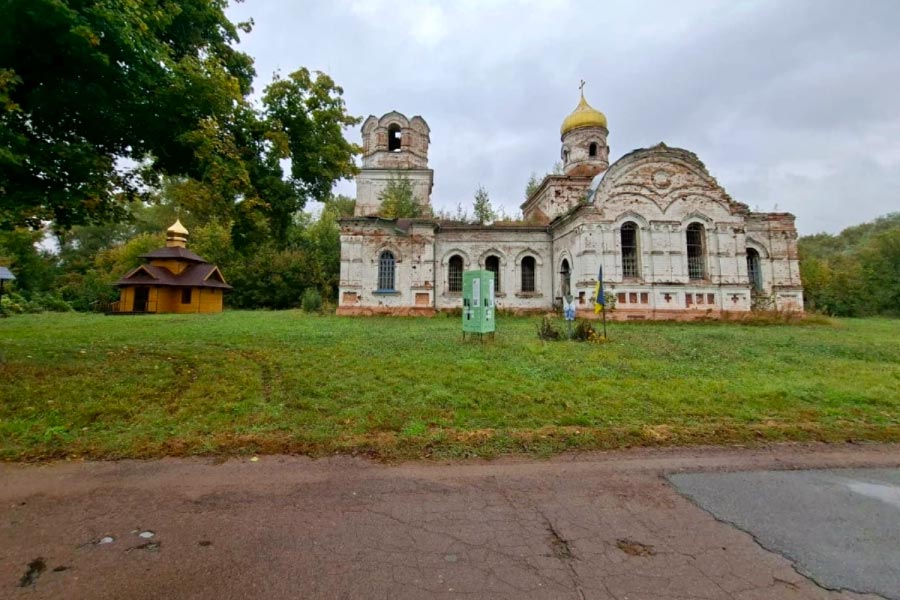
5 cases of war crimes referred to court
To date, five cases related to war crimes in Lukashivka have been referred to the Chernihiv District Court. Verdicts have already been issued in three of them. All three accused are soldiers of the 74th Separate Guards Zvenigorod-Berlin Brigade, who were tried in absentia.
The first case concerned Nikita Belozerov, from the region of Irkutsk, in Russia. He terrorised a family with three children. The verdict states that he and other unidentified Russian soldiers came to the family’s home on three occasions. Belozerov beat the father on the head and back, threatened to shoot him and cut off his fingers, placing his hand on a bench and making an axe strike right next to it. He also threatened to throw a grenade into the cellar where the wife was hiding with the children. Then he looted their house. According to the investigation, in addition to cash, a telephone and a collectable knife, the Russian soldier also took children’s belongings.
Victims and witnesses identified Belozerov from photographs provided by investigators. In addition, his name is on a list of Russian military personnel that was later found in Lukashivka. The Russian occupiers used the piece of paper with the list to leave a note for the owners of the house: “We are sorry we had to use your house! Don’t hurt the cat!”
The court found Belozerov guilty of violating the laws and customs of war, committed by a group of individuals: beating, threatening and torturing civilians, as well as looting. He was sentenced to 12 years in prison. The sentence became effective on 1 September 2023, one month after it was announced. This means that Belozerov’s lawyer did not file an appeal.
However, there were appeals in two other cases. On 28 August 2023, the court of first instance issued a verdict against Alexander Dudarev, from the Russian region of Altai. He is accused of having come to a local man’s house with another Russian soldier on 14 March 2022. The occupiers wanted to obtain information from him about the location of Ukrainian Armed Forces. During the interrogation, they beat the man with their feet, fired shots near his feet, and threatened to kill him. The victim sustained fractures. Then Dudarev’s comrade shot the villager in the right leg. It so happened that he injured himself with the same shot.
The victim identified Dudarev in a photograph provided by law enforcement officers. The Chernihiv District Court found him guilty of violating the laws and customs of war – unlawful detention, threats of murder and beating of a civilian. The Russian soldier was sentenced to 12 years in prison. In December 2023, the Chernihiv Court of Appeal upheld this sentence.
Ihnatenko, the head of the village, reported that the victim in this case died in 2025 due to health issues.
A life sentence for ‘Magnet’ – reportedly killed
The third verdict from Lukashivka was issued to ‘Magnet’, the commander of the same 74th Brigade, from the Russian region of Kemerovo.
Witnesses and victims described Koblik’s appearance in almost identical terms – a leather jacket over a military uniform, and some of them mentioned his half-burned face. People recognised Koblik from a photograph provided by law enforcement officers.
At the time of the investigation, Koblik was in Russia, in the city of Yurga, Kemerovo region.
The Chernihiv District Court sentenced him to life imprisonment. His defence lawyer filed an appeal, in which she did not dispute the Russian commander’s guilt or the classification of his actions in court – but disagreed with the sentencing to the most severe punishment for each of the criminal offences he was charged with. In the lawyer’s opinion, the public resonance of the case and the physical absence of the accused are circumstances that should not lead to a life imprisonment. However, the Chernihiv Court of Appeal upheld the decision.
The victims’ relatives said that they later received information from Ukrainian law enforcement officials about the alleged death of 'Magnet' in the war in Ukraine, in 2023.
NGOs helps identify Russian military personnel
16 of the 21 proceedings are still under investigation.
Puhachov explains the main difficulty: “We do know the facts. I don’t think anything else happened there that we don’t know about. Except, perhaps, for sexual violence that has not yet been reported. We understand which units were in the Lukashivka area and who was in command. But who committed which crime has not yet been established in all cases.”
The prosecutor points out that over the years, fruitful cooperation has been established with organisations that document the wartime events. The NGO Educational Human Rights House – Chernihiv is one of these organisations.
“We developed a documentation methodology to ensure that its results would be admissible by Ukrainian law enforcement agencies and the International Criminal Court (ICC). It was clear even then that, given the scale of the war crimes, they would not have enough resources to collect all the evidence,” Serhii Burov, director of the Educational House, says.
Victoria Glamazda, who documents war crimes for the same NGO, said that there were two monitoring missions in Lukashivka, in August 2022 and June 2025.
“We interviewed ten people and recorded 12 occurrences of war crimes in the village. I was personally most affected by the death of a family: two children and their grandparents. They died because of random shelling. This is also a war crime,” Glamazda adds.
The collected materials and reports gathered by the organisation are stored in a closed database of civil society initiatives baptised “Coalition 5 a.m.”, or “Tribunal for Putin”, or “War Archive”. Lawyers and analysts will be able to use these archives not only now, but also in the future. The information is also passed on to international legal organisations working in the field of universal jurisdiction, a mechanism that could allow to try Russian military men in different countries around the world for crimes committed in Ukraine.
An OSINT (Open-source intelligence) analyst at the Educational House said that at the request of Ukrainian law enforcement agencies, he worked, in particular, on major Koblik.
“We have gathered the necessary information. During our OSINT investigation, we were able to identify more than 10 Russian military men who may have been involved in war crimes in Lukashivka. We have shared the information with law enforcement agencies. But the total number of war criminals is much higher. We have made a specific investigation about the soldiers of the 74th Brigade who occupied Lukashivka,” the analyst said.
He claims that it is possible to identify by name the soldiers who were in a particular settlement during the occupation. Of course, this would require a lot of time and financial resources. It could be done if a comprehensive nationwide programme were established at the state level, he says. However, the question remains whether there is sufficient evidence to prove the guilt of specific military men in specific crimes and bring them to justice.
Command responsibility, a new path?
The investigation is ongoing, and other suspects involved in war crimes in Lukashivka are to be identified. But at this point, it is difficult to say whether all alleged offenders will be identified.
In such cases, investigators say, a solution may be to apply the principle of command responsibility. However, no commander has yet been convicted for this in Ukraine. Before 2025, the possibility of its use, considering the provisions of international humanitarian law, was a controversial issue. According to Puhachov, the Criminal Code does not provide for the liability of commanders for their subordinates’ actions. Under this article, only the offender or a commander who directly orders to kill, shoot, loot, etc. could be prosecuted.
In January 2025, the Rome Statute of the ICC came into force in Ukraine, which now explicitly authorises Ukrainian law enforcement agencies to apply it to commanders.
“We haven’t had such a practice yet. And questions remain. In particular, what level of commanders should be charged with war crimes committed within their range of responsibility? What should be done when there are several units on the territory and, therefore, several commanders? At the Prosecutor General’s Office, we consult international experts who have worked in Yugoslavia, Rwanda and other places where commanders have been held accountable for failure to act. These experts are helping us build key cases based on which we will build other similar proceedings. It is meticulous, complex work, but it is ongoing. We are already in the mid-stages of the process,” Puhachov explains.
“When the mechanism of command responsibility comes into effect, we will be able to charge commanders with war crimes committed by their subordinates. For example, we know that Danil Koblik was the battalion commander in Lukashivka. During that time, war crimes were committed in the village. He did not commit all of them personally. But as a commander, he must be held accountable for them as well,” the prosecutor states.
Rebuilding houses
While the investigations and trials of the Russian military men continue, the villagers of Lukashivka are trying to move on with their lives. Among a total of 280 houses, during the occupation 30 were destroyed and another 200 were damaged. Many houses have already been rebuilt; some people have had modular houses installed in their yards and destroyed roofs and fences have been repaired. A new church has been built next to the destroyed one.
However, some losses cannot be repaired – nine people were killed, and the well-being of many residents was affected. “I can’t live without pills anymore. Of course, we want justice: we want those war criminals to go to prison. But will that ever happen? Right now, our only wish is for peace to come quickly and for the killing to stop,” Nadia Denysenko tells.
This report was produced thanks to a grant by Fondation Hirondelle/Justice Info. A full version of this article was published on July 23, 2025, in "Pechera".


